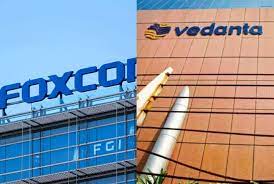In a setback to Prime Minister Narendra Modi’s intentions for Indian chip manufacturing, Taiwan’s Foxconn has pulled out of a $19.5 billion semiconductor joint venture with Indian metals-to-oil behemoth Vedanta, it was announced on Monday.
The biggest producer of contract electronics in the world and Vedanta reached an agreement last year to build factories for semiconductor and display production in Gujarat, the home state of Modi.
“Foxconn has determined it will not move forward on the joint venture with Vedanta,” a Foxconn statement read without providing any additional information.
The business claimed it had been collaborating with Vedanta for more than a year to “bring a great semiconductor idea to life,” but they had mutually agreed to discontinue the joint venture, and it will remove its name from a firm that is now wholly controlled by Vedanta.
Vedanta claimed it had “lined up other partners to set up India’s first foundry” and that it is “100% committed” to its semiconductor project. In a statement, Vedanta said that it has “redoubled its efforts” to realize Modi’s ambition.
According to a person with knowledge of the situation, delays in the Indian government’s incentive approval processes were a factor in Foxconn’s decision to abandon the project. The source continued, “New Delhi had also raised a number of concerns regarding the cost estimates provided to request incentives from the government.”
In order to usher in a “new era” of electronics production, Modi has made chipmaking a top priority for India’s economic strategy. Foxconn’s decision is a setback to his hopes of persuading foreign firms to start making chips domestically.
Neil Shah, Vice President of Research at Counterpoint, stated that the failure of the agreement “raises eyebrows and doubts for other companies” and “is definitely a setback for the ‘Make in India’ push.”
Foxconn’s decision, according to Deputy IT Minister Rajeev Chandrasekhar, had “no impact” on India’s ambitions because both businesses were “valued investors” there.
He stated that it was not the role of the government to “get into why or how two private companies choose to partner or choose not to”.
A crucial step
Foxconn is best known for producing iPhones and other Apple products, but in recent years, the company has been diversifying its revenue stream by introducing new chip products.
A few nations, including Taiwan, produce the majority of the world’s chips; India is a late entry. In Gujarat last September, the Vedanta-Foxconn joint venture unveiled its plans to manufacture chips. Modi referred to the initiative as “an important step” in advancing India’s chip manufacturing aspirations.
But the execution of his plan had been sluggish. Deadlocked negotiations to include European chipmaker STMicroelectronics as a tech partner were one of the issues the Vedanta-Foxconn project ran into.
Even though STMicro agreed to a technology licensing deal with Vedanta-Foxconn, the Indian government had made it clear that it wanted the European company to have more “skin in the game” by taking a stake in the collaboration.
According to a source, STMicro did not like that and the talks were put on hold.
In order to recruit investors for the semiconductor industry, the Indian government has stated that it is still optimistic. A chip testing and packaging unit, rather than a production facility, would get up to $825 million in investment, Micron announced last month. A total of $2.75 billion will be invested, with help from Gujarat and the national government of India.
Three requests to establish factories under a $10 billion incentive program were received from India last year. The country anticipates its semiconductor market to be worth $63 billion by 2026.
These were from the joint venture between Vedanta and Foxconn, Singapore’s IGSS Ventures, and the international consortium ISMC, which features Tower Semiconductor as a tech partner.
Due to Tower’s acquisition by Intel, the $3 billion ISMC project has also been put on hold, and IGSS’s $3 billion plan was also shelved because the organization wished to reapply.
Applications from businesses for the incentive program have been requested again by India.

















